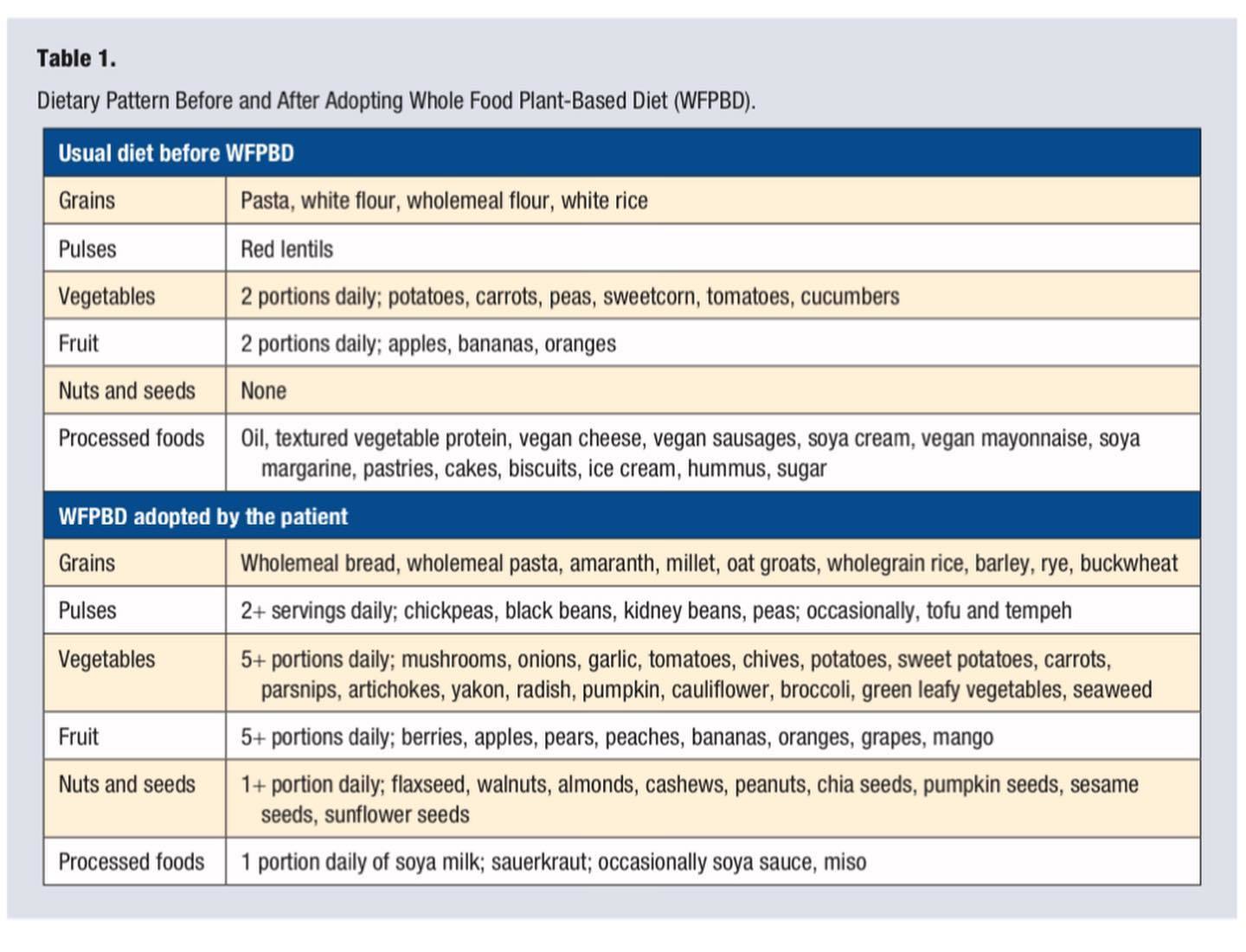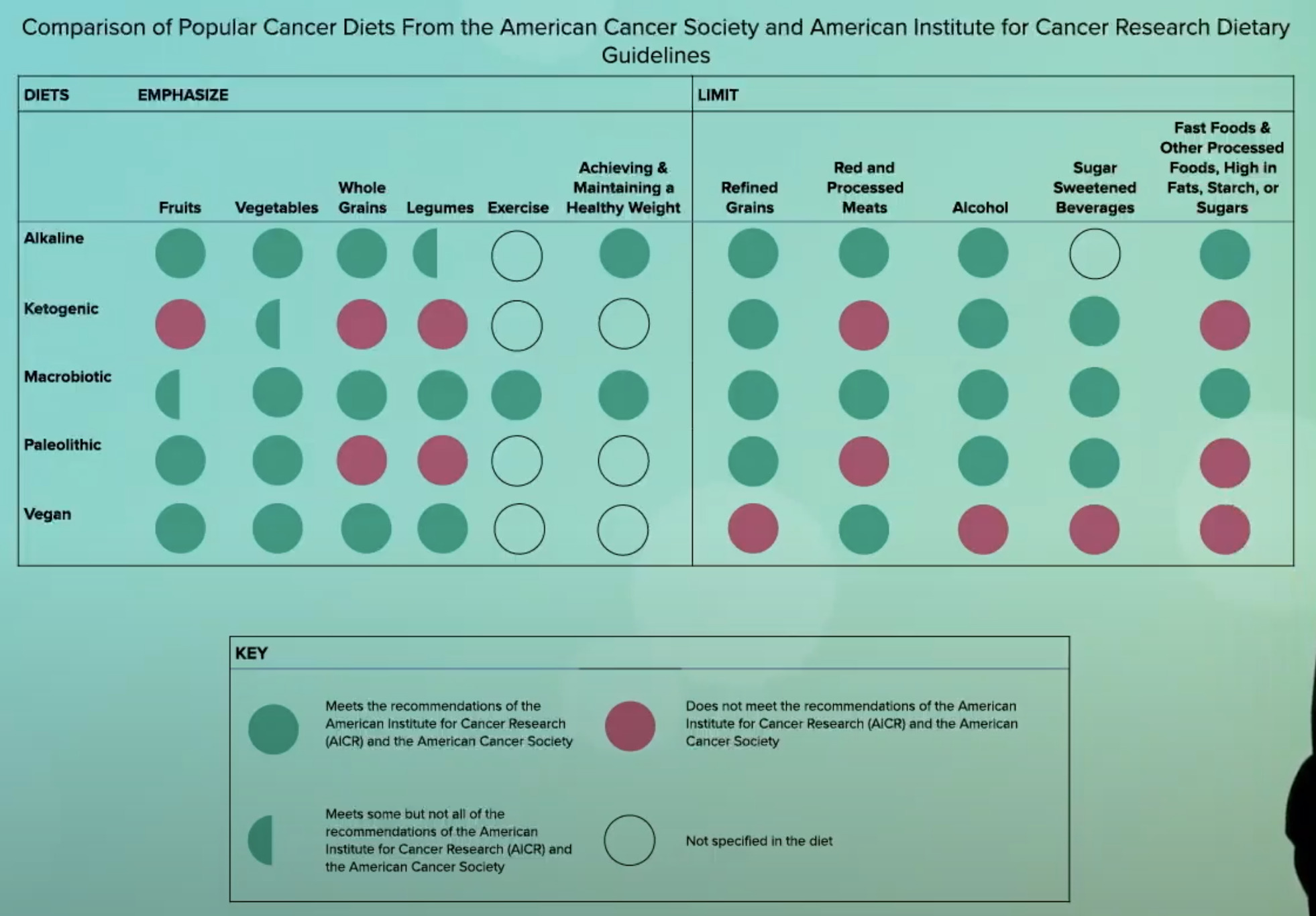(2008) The Fat Vegan (2008) by Dr McDougall offers a perspective.
(2002) Are You a Sickly Vegetarian (Vegan)?
In his webinar on Cancer & Fasting, Dr Greger compared how well various diets stack up against 10 Recommendations by AICR (American Institute for Cancer Research). Turns out that Veganism is excellent for one recommendation: 'Limit Consumption of Red and Processed Meat'. However, Veganism fares poorly as far as four other recommendations are concerned: (a) refined grains, (b) alcohol, (c) sugar sweetened beverages, and (d) fast foods and other processed foods (high in fats, starches or sugars). Additionally, it says nothing about (e) exercise and (f) achieving and maintaining a healthy weight.
In Dining by Traffic Light: Green Is for Go, Red Is for Stop (2018), Dr Greger says:
In this short podclip, Dr Greger says:
(5 mins) Is Vegan Food Always Healthy? explains that in addition to 'no animal products' guideline followed by vegans, adherence to 'no processed foods' guideline would boost health significantly. Towards the end, he explains this point with respect to diabetes risk.
(8 mins) Transcript. Dr Greger's summary: "Just because you're eating vegetarian or vegan doesn't mean you're eating healthy."
(4 mins) Transcript. This video explains that the simple guideline of 'eat more plant foods' is effective in promoting health. The more behaviour patterns we adopt for boosting (health, non-processed) plant food consumption, the more the impact to our health.
(5 mins) Transcript. The main point of this video is that high clonic pH (reflected in stool pH) is associated with high colorectal cancer risk. At offset 4:03, Dr Greger explains, "Remember these two groups? Dramatically different stool pH, yet both groups were vegetarian. But the high risk group was eating mostly refined grains, very little fiber, whereas the low risk group was eating whole grains and beans, packed with fiber for our fiber-friendly flora to munch on."
An amazing lecture by Dr Greger in which he explains how becoming 'vegan' may not reduce our risk for heart disease and stroke. What to do? This is a great video for adopting a 'healthy vegan diet' aka Whole Food Plant-Based guidelines, with special emphasis on the role of omega-3 vs omega-6 ratio, flax seeds, arachidonic acid, and so on.
I love this video for an interesting viewpoint! Through adoption of veganism, we help myriad animals avoid suffering. But with the rise of veganism, the processed food industry has responded with a panoply of processed vegan foods (which are counterparts of processed non-vegan foods): vegan pastries & pizzas, vegan candies & ice-creams, and so on. All this is wonderful from a vegan standpoint as it avoids the suffering of many animals. But there is one animal that continues to suffer: humans! [I smiled when Dr Klaper said that] To alleviate that animal's suffering (human suffering from modern chronic lifestyle diseases), we need to adopt Whole Food Plant-Based guidelines.
In the article That Time I Stented A Vegan (2018), Dr Heather Shenkman describes a man in his 50s who had been inspired to go vegan after watching Forks Over Knives. However, his heart showed abnormalities, necessitating a stent. The man then adopted Esselstyn-style strict Whole Food Plant-Based guidelines. An excerpt from the article:
Case Report: Managing Psoriatic Arthritis With a Whole Food Plant-Based Diet: A Case Study by Marta Lewandowska, Kate Dunbar and Shireen Kassam, Am J of Lifestyle Medicine, Feb 2021.
The case report above (published in Am J of Lifestyle Medicine, Feb 2021) is actually co-authored by Kate Dunbar herself. She turned vegan about 13 years ago — it helped her psoriasis but not entirely. In 2018, she turned Whole Food Plant-Based, SOS-Free (ForksOverKnives diet + no-salt) to say goodbye to psoriatic arthritis!
Kate Dunbar shares her personal story in a blog entry too: Reversal of psoriatic arthritis with a whole food plant-based diet (2019), hosted by Plant Based Health Professionals UK. What was the difference betweeen her Vegan [Before] diet and her WFPB-SOS [After] diet?

Kate Dunbar's personal story is a rare case report published in medical literature in which the shift in meals was from a Vegan to WFPB SOS-Free diet.
- Kate's Vegan [Before] diet had lots of processed foods (with "oil, textured vegetable protein, vegan cheese, vegan sausages, soy cream, vegan mayonnaise, soy margarine, pastries, cakes, biscuits, ice cream, hummus, sugar"), refined grains (white flour, white rice), very few beans, veggies and fruits, no nuts and seeds.
- Kate's WFPB SOS-Free [After] diet reduced processed foods to only soy milk, sauerkraut and occasional use of soy sauce and miso. Nuts and seeds were introduced (1+ servings). Serving sizes of veggies, fruits and beans (pulses) were boosted. Grains were exclusively whole grains (no refined grains). An SOS-Free diet has no Salt, Oil or Sugar.
This podast has two guests: Dr. Shireen Kassam and Kate Dunbar, both of whom are co-authors in the psoriatic arthritis case report published in Am J of Lifestyle Medicine.
Kate Dunbar narrates her personal story in the first 8 minutes. The rest of the video is about cooking.
The "Whole Food" part of Whole Food Plant-Based guidelines is illustrated in this personal story. If we are 100% vegan but eat processed foods in abundance, we don't feel that good.
(2022) I Have So Much More Energy After Going from Vegan to Whole-Food-Plant-Based by Ruzielle Ganuelas (Forks Over Knives).
(2022) Elizabeth TeSelle: Beyond Veganism at McDougall Success Stories.
(2021) My Journey from Junk-Food Vegan to Whole-Food, Plant-Based by Nellie Vance. Also available as a podcast: My Journey From Junk-Food Vegan To Whole Food Plant-Based.

 Instagram
Instagram YouTube
YouTube